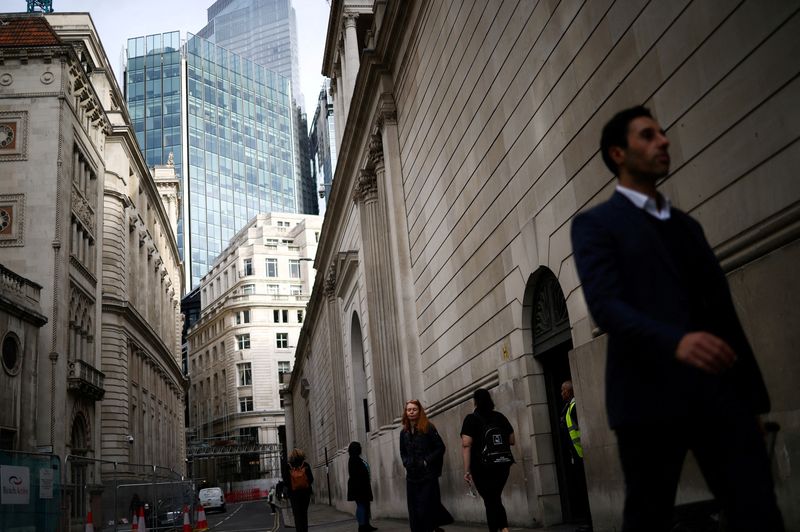By Mike Dolan
LONDON (Reuters) -About the only positive thing spoken about sterling right now is that Britain's policy chaos has abated somewhat - but that's where the optimism seems to stop.
As markets await the Bank of England's latest policy decision on Thursday, it's hard to believe it's only been six weeks since it last raised interest rates by a modest half percentage point to 2.25% - a day before one of the most botched government budgets in modern history was unveiled.
The unfunded tax-slashing plan almost exploded the entire economy.
Since Sept. 22, the pound, UK government bonds, pension funds and the mortgage market, the standing prime minister and finance minister and British economic policy credibility at large were all shredded. And economic policy is only gradually being taped back together before the BoE meets again.
And even as the Bank gathers this week amid expectations of a further 75 basis point rate hike to 3% - what would be its biggest rate rise in 33 years - the central bank has yet receive details of a reworked and costed budget from new Prime Minister Rishi Sunak and Chancellor of the Exchequer Jeremy Hunt.
Amid reports they still need to fill a budget hole in excess of 40 billion pounds with tax rises and spending cuts, the plan was delayed to Nov. 17 - leaving the BoE with little visibility on what its setting monetary policy against or how to formulate its inflation and growth forecasts.
The fear for many is the pendulum now swings too far back in the direction austerity, deepens recession and ties the BoE's hands in just how much it can tighten.
Billionaire financier and famed sterling speculator George Soros this week warned of such an overreaction.
"Sunak must be careful not to impose too much austerity, which could trigger a full-blown financial crisis in a country that is facing many headwinds, including a shortage of affordable housing and a looming pension crisis," Soros wrote.
Many investors fear the BoE will be just left carrying the can. "We think the Bank of England will err on doing too much than too little," said PIMCO portfolio manager Peder Beck-Friis. "Contractionary fiscal policies may end up lowering inflation faster than expected, potentially leading the Bank of England to pause early next year already."
How sterling handles the middle ground may be critical.
"UNDER-DELIVERING"
To the BoE's credit, it's played a lousy hand with some success over the past month and half of turmoil.
After intervening to stabilise gilts and wobbling pension funds, and managing to bookend those purchases at just two weeks, it went a step further on Tuesday by actively selling gilts back into the market without great disturbance - part of its planned but delayed balance sheet wind down.
Tuesday's smooth gilt sales may be a mark of the quick healing within bond markets since September's shock - allowing the pound's near 10% bounce from the record low crater hit against the U.S. dollar the week after the "mini" budget.
Along with hopes for a more believable fiscal rethink, recovery in both markets have helped drag rate rise expectations for this week down from as much as 125bp at the height of the crisis. It's also pulled the implied peak Bank rate next year some 150bp lower to 4.75% over the same period - back below the assumed 'terminal rate' at the U.S. Federal Reserve.
All of which may either tempt investors to wade back into sterling in the hopes of riding a long-term recovery from undervalued territory - or now fret that relative interest rate returns will never fully compensate for the embedded risks.
Deutsche Bank (ETR:DBKGn) currency strategist George Saravelos, who warned that a classic sterling crisis may be brewing weeks before the budget blowup, feels the pound can only stabilise here at best even if the worst of the crisis in fiscal policy credibility had passed.
Saravelos said any passing of the political shock should allow traditional positive correlations between yield and currency to resume.
What's more, Britain's chronic current account deficit with the rest of the world - sterling's Achilles heel - may well narrow further from the explosive energy shock levels of early this year as household spending and imports are squeezed and energy prices get capped amid all the fiscal tightening.
But "these fiscal changes likely come at the cost of growth," Saravelos concluded, adding real inflation-adjusted British yields were still too low compared to other major currencies and further sterling slippage back to $1.08 was likely this year unless the BoE indicated it would take rates up to at least 5%.
"We see the risks skewed towards the BoE sounding dovish this week and ultimately "underdelivering" versus current pricing," the Deutsche analyst wrote. "As global growth slows and rates rise across the world, attracting capital is getting trickier."
HSBC (LON:HSBA)'s team are no more hopeful, offering only a crumb of comfort that they did not now expect the pound below dollar parity this year. For them, Britain's "twin deficits" in budget and balance of payments still require the economy, interest rates and currency to adjust continually to find equilibrium.
Long-term valuation models were only of marginal help is judging where the pound would go from here, they said.

"During previous periods of sterling undervaluation after significant structural, supply-side shocks to the UK economy - in 2008 and 2016 - the currency fell to around 20% below its long-term fair value," HSBC said. "With sterling currently around 10% undervalued, a further 10% decline is plausible. But such excessive cheapness is unlikely to be sustained."
The opinions expressed here are those of the author, a columnist for Reuters.
(by Mike Dolan, Twitter: @reutersMikeD; Editing by Josie Kao)